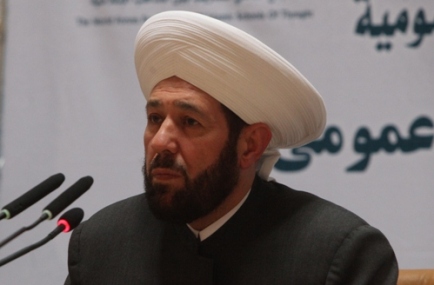Syria Grand Mufti: Religious dissension is a plague for Islamic Awakening

 Sheikh Bad el Din Hassoun, Syria grand Mufti, in an exclusive interview with Taqrib News Agency (TNA) on the sideline of conference on “Role of Muslim World in Global Power Geometry” held in Tehran highlighted importance of maintaining Islamic unity and solidarity among different Islamic movements as well as commitment to objectives of Islamic Awakening.
Sheikh Bad el Din Hassoun, Syria grand Mufti, in an exclusive interview with Taqrib News Agency (TNA) on the sideline of conference on “Role of Muslim World in Global Power Geometry” held in Tehran highlighted importance of maintaining Islamic unity and solidarity among different Islamic movements as well as commitment to objectives of Islamic Awakening.
Sheikh Hassoun warned against institutionalization of Takfir (excommunication) thoughts in some Muslim states including Syria and noted,” The only way to freedom from the present crisis in the country and confrontation with extremist movements is to promote constructive talks among Syrian groups and confrontation with the groups whose objective is collapse of Syria.”
He added,” Maintaining unity among Syrian nation including Shia, Sunni, Christians and … can be an effective solution for the widespread intrigue in Syria.”
Syrian cleric referred to the issue of resistance in the region and reiterated,” Resistance against occupation and brutal behavior of the Zionist regime is a preventive measure against their exorbitance.”
He added,” The issue of Palestine is a vital issue and the major concern for the world of Islam and we hope that increasing Islamic unity will lead to liberation of Al Quds from the Zionists.”







